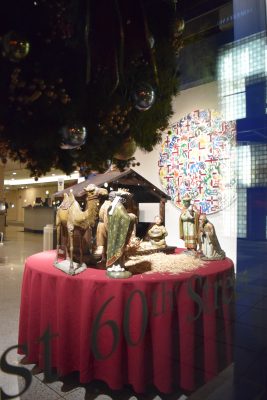The Holidays Need Inclusivity and Representation
December 10, 2016
Fordham University is located in a notably liberal area: the northeast. Hence, people at this school are generally used to the inclusivity of the diverse population in our area. New Yorkers, for instance, took a stand when native Texan and presidential candidate Ted Cruz made anti-Semitic remarks about “New York values.” In New York City, most people are at least supportive of, if not also educated about, the many cultures that call this city home.
But this is a jaded perspective. In the United States as a whole, many people are ignorant, whether blissfully or willfully, of important aspects of numerous cultures, including their holidays.
Google Trends, which measures the popularity of terms entered into the search engine, is often a good indicator of how frequently people are thinking about a subject. Within the parameters of the United States; the terms “Christmas,” “Kwanzaa,” “Hanukkah,” “Yule,” and “Omisoka;” and the “holiday season” of 2015, which I entered as Nov. 28 to Jan. 6, I came up with some interesting statistics. The peak numbers were 100 searches for Christmas, 2 for Hanukkah, 1 for Kwanzaa and Yule, and 0 for Omisoka. Christmas averaged at 20; the others all averaged at 0. The numbers are distributed much more equally when “Christmas” is removed.
Fordham students seem to have a better grasp on multicultural holidays. In a survey I conducted among 26 Fordham students, I found that all of them had heard of Christmas, Hanukkah, and Kwanzaa, while two had heard of Yule and one had heard of Omisoka.
To stray from statistics and focus more on personal experience, I have always been overwhelmed with the Christmas experience in December. Even going to school in a significantly Jewish town, Christmas was always the holiday in the forefront. Additionally, the greeting I have most commonly heard from people, both in casual conversation and more formal situations, is “Merry Christmas,” with “happy holidays” only coming from cashiers and the like.
I include all this information to enforce a point: diversity is not represented as well as it should be, and it shows. As evidenced by the survey I conducted, Fordham students are aware of the under-representation that is happening here and across the country. One student — Annalee Tominelli, FCLC ‘20 — described the lack of equal representation: “People forget that there is no established religion or culture, and we should embrace the melting pot more than we do.”
It truly is a shame that several cultures’ holidays are not given the proper respect they deserve. While I am aware that Christianity is the most populous religion in the United States, that does not mean that it’s holiday is the only one that matters. After all, the term “holiday season” has risen to prominence for a reason: inclusivity of all holidays is important. We often hear about how important representation is, and the holiday season is a vital time for the enforcement of this notion.
Now, while I recognize that pointing out a leak in the ceiling is a good first step, it does not help unless the leak is fixed. So, that begs the question: what are the appropriate steps for celebrating the holidays and including as many cultures as possible?
The first step is to forget “Merry Christmas,” unless you are talking to someone you know is Christian, and instead convert to “happy holidays.” It is not a monumental change, and it is one we all can make. We must set the example and then encourage others to use the same phrase. It spreads positivity that is appropriate during this cheerful time of year and avoids an uncomfortable exchange with someone who is not Christian.
The second step is to advocate for representation in public places. Starbucks is doing this right: their “Red Holiday Cups” do not include any religious paraphernalia, promoting equality of all cultures. But not all places achieve this inclusiveness in their decorations. If a store is having a Christmas sale, you can ask the owner personally to rename the promotion a “holiday sale.” Little things like this go a long way for people who feel uncomfortable with the idea of Christmas being promoted over their culture’s holiday.
Lastly, you should reach out to friends and family and let them know of your support. Ask your Japanese friend if he is celebrating Omisoka. Tell your Pagan friend that you hope they have a fantastic Yule. Get your Jewish friend a Hanukkah present. You get the idea. Like I said, small actions can have a tremendous impact.
The holidays are supposed to be about spreading joy and positivity. After all, it is the “most wonderful time of the year” and the “happiest season of all.” Restricting the season to just one holiday is detrimental to the season’s goal. Make sure everyone in your life is happy this year by letting them know their holiday is valid.













